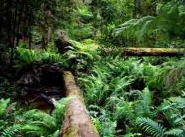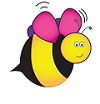Mirboo North - Lyrebird Forest Walk


The Lyrebird Forest Walk is an easy one and a half hour bushwalk through native forests typical of the South Gippsland region.
2.8 km north of Mirboo North on the Strzelecki Hwy, this walk consists of two walks totalling approximately 4.8 km as it winds through the Strzelecki State Forest. Stroll through the gully by the Little Morwell River where platypus have been spotted, continue your walk across the bridge to the Coral Fern Gully. This part of the Strzelecki Ranges takes in the natural beauty of the stringy barks, grey gum, banksia, soft ferns and tree ferns. Amongst the vast range of native plants the Lyrebird Forest is home to lyrebirds, crimson rosellas, short and long nosed bandicoots, koala, wombat, black wallaby, echidna, black cockatoos, and many, many more birds and animals. A night walk with a torch can be particularly rewarding.
Signs on the main highway indicate the entrance to the car park and picnic area where the walking track begins and ends. Initially the track follows the Little Morwell River for 1km through characteristic gully vegetation of tall eucalypts with a thick understorey of scrub and ferns. Reaching open farmland which is private property, the path follows the edge of the forest, passing vegetation typical of the drier slopes and ridges. The trees are smaller and different species to those in the gullies and the forest is generally more open on the upper slopes. Halfway up the hill a secondary link track to Coral Fern Gully will take the bushwalker back to the car park by a shorter 3 km route.
The main track continues until a gravel road is reached. Follow this for one kilometre until a well marked turn directs walkers back into the forest towards the car park.
The Superb Lyrebird is often seen in patches of dense scrub along the track. Fully grown it is about the size of a large chicken. The male has a set of ornate tail feathers which it spreads in display when performing on its mound in the forest. The Lyrebird is noted for its ability to imitate the calls of other birds, and can also reproduce the sound of car horns, chain saws and other man-made noises. A female Lyrebird produces one egg per year and she is the only one to care for the chick. Lyrebird numbers have been reduced by land clearing and predators but still thrive in the scattered areas of native forest around Mirboo North.
Other birds commonly sighted include: White-throated Treecreeper, Yellow-tailed Black Cockatoo, Scarlet and Eastern Yellow Robin, Brown Thornbill, Grey Shrike-Thrush, Laughing Kookaburra and the Crimson Rosella.
Trees and plants along the Lyrebird Forest Walk include: Mountain Grey Gum, Brown Stringybark, Messmate Stringybark, Silvertop, Yertchuk, Blackwood, Saw Banksia, Common Heath, Soft Tree-fern and Austral King-fern.
Some of the native animals to be seen are the Wombat, Koala, Black Wallaby, Short Nosed and Long Nosed Bandicoots, Swamp Rat, Greater Glider, Feathertail and Ringtail Possums, Echidna, Platypus and little Brown Rat. Most of these are nocturnal in habit.
Several varieties of poisonous and non-poisonous snakes inhabit this forest and are especially active in the summer months. If you see a snake, don't panic, stand still or stamp. Snakes nearly always move away when they feel footstep vibrations.
The country around Mirboo North was thrown open for settlement in the 1880s. The soils in the area in which the walk is located were generally not rich enough to support agriculture and as a result the land was left under forest for the production of timber. A small sawmill was located where the car park is now.
Evidence of early logging activities can still be seen in the series of deep notches on many of the taller stumps. The notches allowed boards to be jammed into the trees. These crude steps enabled the loggers to cut through the trunk above the buttresses (the swelling roots) at the base of the tree, using the axe and the crosscut saw.
Distance: There are two options: a short 3km track, or a longer 4.8km track.
Terrain: Reasonably flat terrain, but some path sections are narrow and may be slippery after rain. Surface is mostly gravel.
Directions: The Lyrebird Forest Walk is located 3.3km north of Mirboo North and is accessible from the Srzelecki Highway. Limited parking and picnic tables are available.
Access for Dogs:
Dogs must be on a lead at all times.
Location
Srzelecki Highway, Mirboo North 3871 Map











